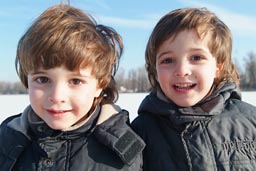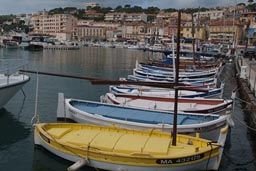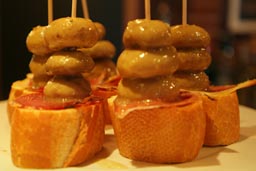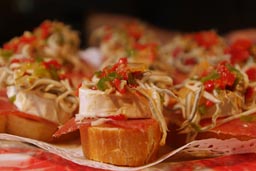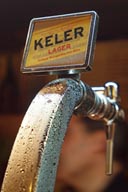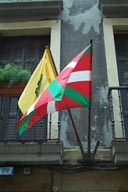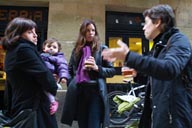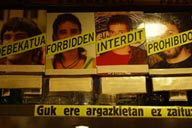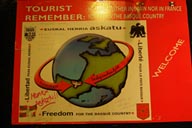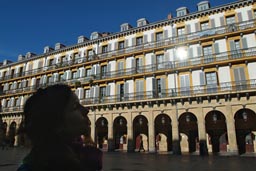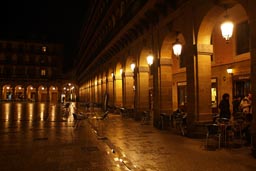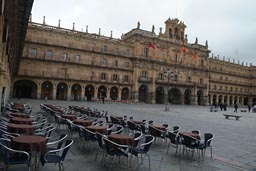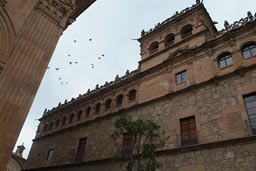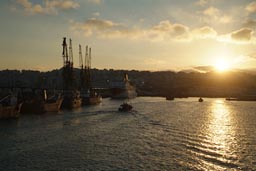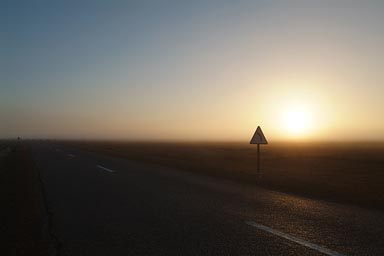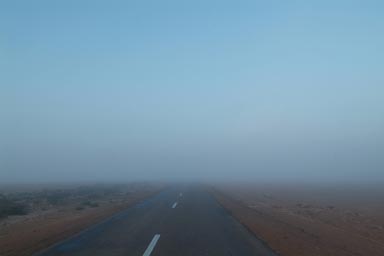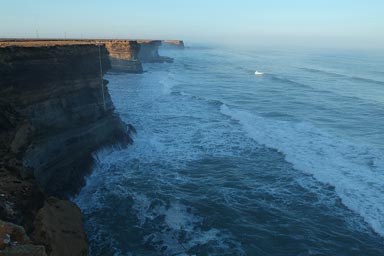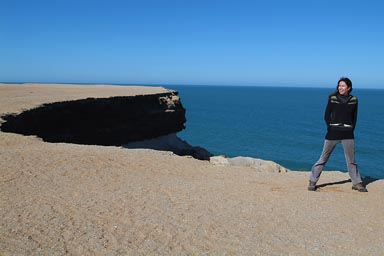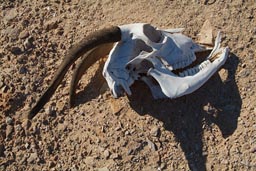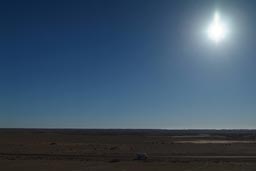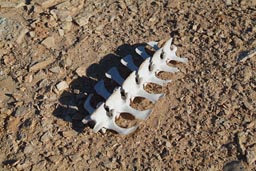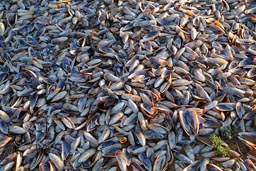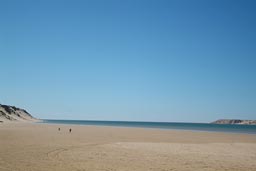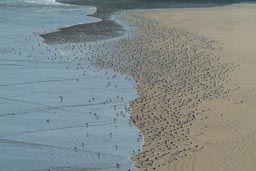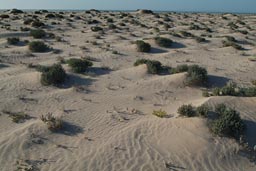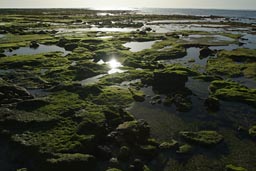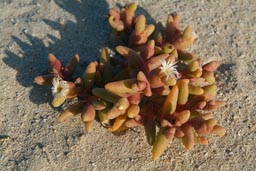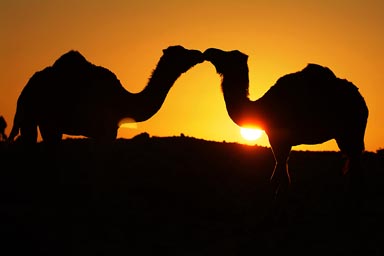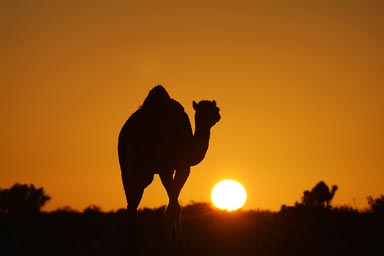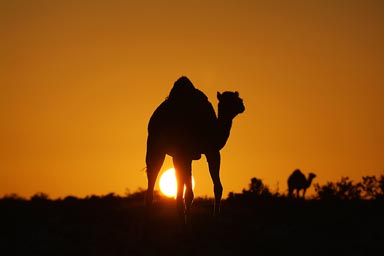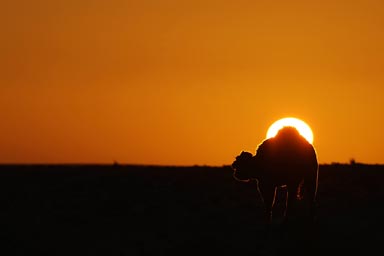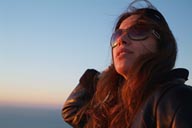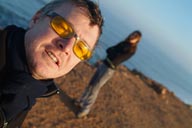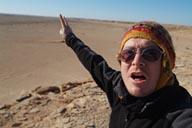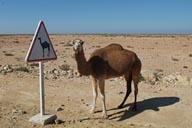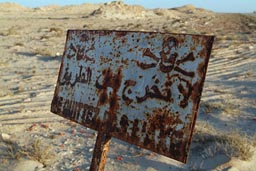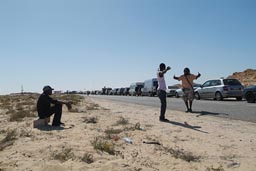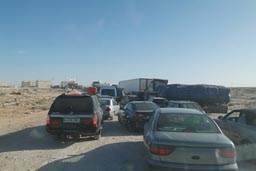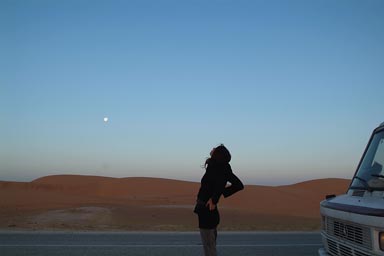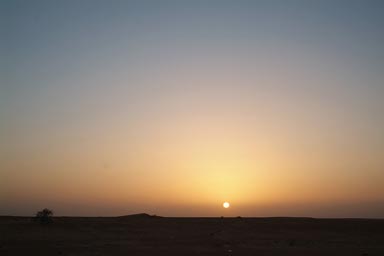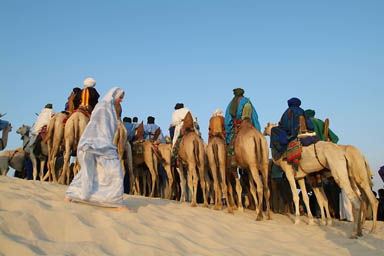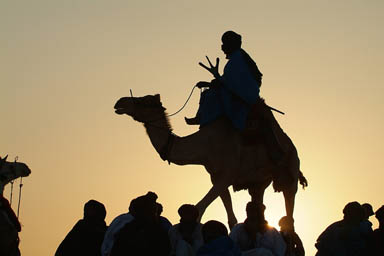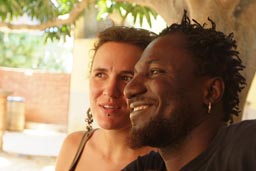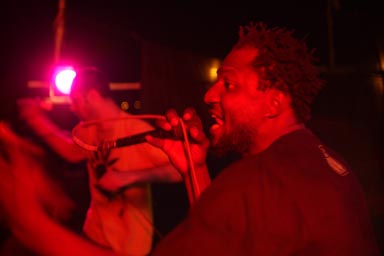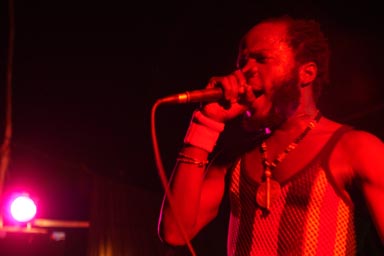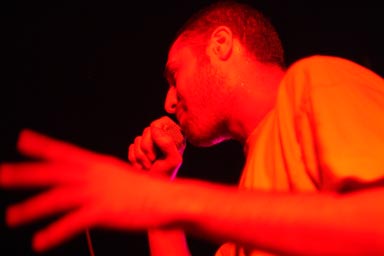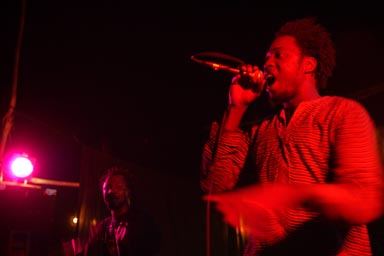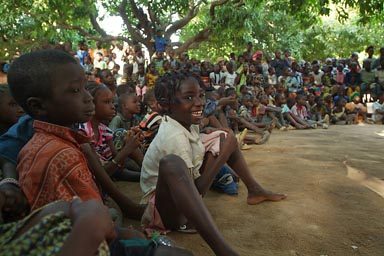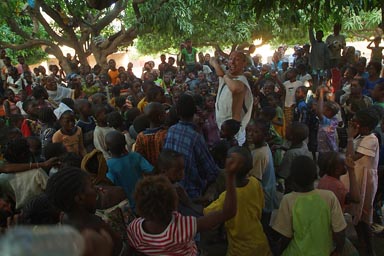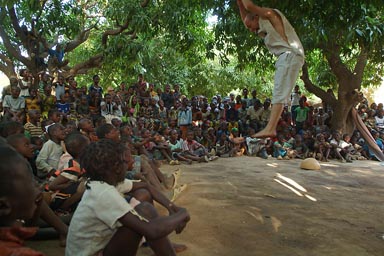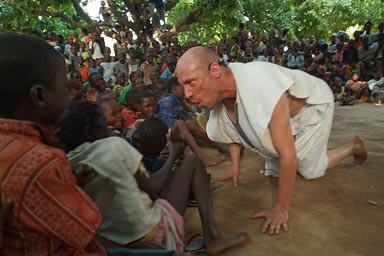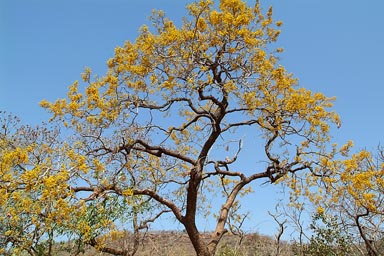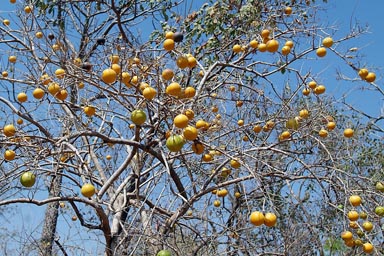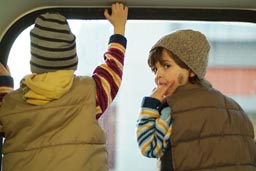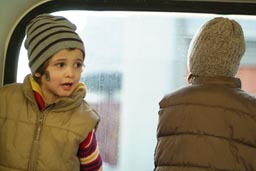www.thisfabtrek.com > journey > africa > mali > 20110129-bamako
Legendary journey south through space and time.
Download GPS (KML) track/waypoints.
So why bother reading that sh!t? He is not yet insane but clearly loosing the plot; this piece you contemplate to delve into is to date the soundest implication that after all those years he still doesn't know what he wants to say. That's true folks! Here is another legendary journey through space and time, another Back Down South trek, with its inevitable reflections and I understand you're tired off such crap, so for the sake of nothing do it one more time, read it! And if you're seriously pissed off after then go and watch TV, I recommend a US-shopping channel, the one where you can choose your home office furniture from several nice brown decors.
Here in Vienna Christmas and New Year are over and it's been freezing recently. I took my boys ice skating on the very same Old Danube lake where I learned to skate 40 years ago. My twin boys, Daniel and David are almost 4 now and I miss them already as we hit the Autobahn this 6th of January, drive west.
Christina and I drive out in the old Mercedes 307 van that had served us so well, her and me on the Middle Easter Journey and me and my boys equally on the North Cape journey. It's already 4 in the afternoon, temps are still a minus 5°C and the heating of the van, the vent won't work and we wrap up in blankets and sleeping bags. I am glad and simply glad it still rolls, caress the steering wheel like the neck of a good old horse; I speak to the old mare. She's got to hold even she has almost 300,000kms on the clock; she has to do some more work, ideally drive us all the way down to Mali, through desert and Sahel some 8000kms.
5 hours later and plus degrees when we get to Innsbruck, this is Tirol, this is Foehn, a wind phenomenon that dries out the valley in autumn or clears all the snow in a matter of days in winter and sends down avalanches. The weather is hard on people in the Inn valley, who suffer from headache, drowsiness, craziness, drives them literally up walls or into traffic accidents; in German language even the hairdryer is called a Föhn. It surely rains south of the Alps, it rains off when the weather hits the mountains, as air cools. Here north of it in the valley on the lee side the remaining dry air races down the slopes driven by suction rather than weight, it falls down the valley and heats up, produces the dry Foehn storm, this madness.
We meet Arthur, contemplate new African adventures, a boat journey up the Senegal River then down the Niger River, but who knows when? We get up early in the morning, sun shows up as we drive up Brenner pass into Italy, then drop down the Dolomites to Alto Adige/South Tyrol, the part of Austria the Italians nicked after World War 1, Trento then Verona and yes - surely enough it pours, thick fog lies subsequently over the Po valley, it rains till Genoa/Génova at the Ligurian Sea, late in the day after 12 hours of driving Nice in France is drier while we see Katja over a pizza. The same evening we still head on towards Cassis near Marseille, we need to move on quickly, we are on a mission, kind of. Temps this night are finally a moderate 10°C, remind of last summer, the good times - and my boys.
Morning and sun warms while with a thought of yearning we swig this morning café au lait and the pappy croissant, this is the very same cafe on the old port where we sat last summer while my boys ran around in circles always close to the edge almost falling into the water, so curious about the fishing boats. Cassis in summer these days is a tourism machine but the ancient Van Gogh beauty, the sleepy-ness of a fishing village, the colours of the Mediterranean it comes out undisturbed in winter; maybe a bit how I got to know her almost 40 years ago. My father has taken us here 7 times when I was a boy, then I came alone so often, taken every girlfriend and wife here, and now I have already taken my boys here twice and I will come again and again as long as I can.
We buy lait-cru camembert and baguette, then head on through Marseille and Montpellier where we lose our road. Then it is the usual lovely drive over the mountains to Albi, then Gaillac where Philippe and Caroline wait with fois-gras and Souterne. Next morning past Toulouse in St. Croix we pick up 5 computers for friend Julie’s Malian project, Collectif Yeta.
There is rain on the way all the way and it only just stops before we enter Spain, St. Sebastian, Basque and tapas capital. Beer is served half in already small glasses; Zurito it is called, fizzy white wine is poured from a meter high into the same beer/water glasses; Chacoli is it called, the local red just goes by tinto; decent red wine, same type of glass obviously. The tapas bars around Konztitutio Plaza are full, old men in Basque hats and their women mix with young rebel folk, we meet Iñigo, Saioa, Unai, Esti and the Croat Goran, university friends of Christina. The hats and wines and delicious snacks want to remind me of France and there then we dive right into politics.
Our friends let arise no doubt, this is neither France, nor Spain, but Basque Country. Basque is the oldest language group in Europe with no apparent or known link to any other language. Basque People want independence or at least greater autonomy. Yes, the Catalans have recently edged out more freedom from Madrid, they managed better than the Basque in their pursuit of autonomy; here all is stuck in the latest cease fire, just announced in these last few days. Here everyone is so easily branded a terrorist, tell our friends; after 9/11 Madrid has learnt a thing from Washington, and then the Basque rebels, militants or just young enthusiasts are imprisoned and spread all over Spain; bring them home can be read on posters.
We leave early on Tuesday, see Salamanca on the run, run out of gas shortly after, then after a few more long hours driving spend another night past Sevilla; Sevilla, love of mine, one day I will come and bring enough time! Wednesday morning is nice, the blue skies over Phoenician found Cadiz invite for another fine Spanish lunch, pokerones (anchovies) fritos, artichokes a la plancha, goat's cheese and honeyed onions on a bocadillo. In Tarifa all is easy; we are on a ferry headed for Africa.
Africa my drug.
Africa, my dark continent, where I tried to see and found colour, this, my Africa is waking up, this time the phoenix may rise from the subdued ashes. When we set over straight of Gibraltar Tunisia has been burning for weeks, riots sweep through the capital, a defiant people rock the kleptocracy of Ben Ali and wife and family. We enter Morocco and the Wikileaks US embassy cables reveal the very same problems, "the appalling greed of those close to the King," as in Tunisia's case it takes away all opportunities of those not connected. Days later we sit in front of the TV with my Moroccan family, we watch the only real news network, Al-Jazeera, we watch Ben Ali take flight and nobody wants to hear my fear or predictions that other Arab (Egypt, Jordan, Yemen, Libya, Algeria) and African dictatorships (Burkina, Cameroon) might follow suit; even I could not have predicted such a quick ouster of Mubarak; it takes just another 3 weeks - and more demonstrations all over North Africa and the Middle East. It feels almost like 20 years ago Poland, Hungary, Germany, dominos falling..., then on TV, now on our computer screens a new age of revolutions unfolds and it won't be over so soon!
Africa, my drug, further south you are becoming even messier, again messier. In Cote d'Ivoire the elections that were supposed to resolve created a dangerous political stand-off, a humanitarian debacle, another refuges crises, ECOWAS/AU talk of sending troops but really there is no easy solution (irin is a good read).
We are headed south for Mauritania and ultimately the Malian Festival on the Niger River – for all these countries, actually the whole of the Sahel region the usual kidnappings/al-Qaida warnings have been reissued, officials are covering their buttocks for the time of the tourist season, just in case; and yes, we worry. Before leaving Vienna my Malian consul calls that a bomb had exploded in front of the French embassy in Bamako: "It's reached the capital," he dramatised events. A young man had thrown a homemade bomb and fired gunshots, wounding two Malian bystanders, the crowd around fell over him when he tried to escape; the police had to rescue the terrorist. Almost out of reflex AQIM (al-Qaida Organization in the Islamic Maghreb) is being blamed. The most unprofessional terrorist would later somehow manage to escape prison in Bamako, triggering the dismissal of the prison director, another 3 weeks later the man would be re-caught in Gao 1000kms east.
More serious and very sad at around the same time two Frenchmen are kidnapped in Niamey, Niger 24 hours or so later executed during liberation operations.
Yes it gets to us and we are worried going south! Here in Rabat, Morocco now we queue for visas at the Mauritanian embassy and the queue is long; there are as many overlanders/adventure seeking tourists as in previous years, maybe not so many French. We all certainly go south with some fear, or with a deaf ear and blind eye, call it Russian roulette; one of us might get hit but not all of us... Mauritania, like most of Mali and Niger is red zone in travel advisory jargon/don't go! We are all disobedient.
The sun slaps down on us, it is Friday, time of lunch prayers, come at 12 before prayers they said, prayers start, prayers end, the consulate staff has certainly eaten their Friday lunch couscous by now, certainly slept through their post-Friday-lunch-couscous siesta, they are back after 3, showing eloquence and serve ladies first, I send Christina to the front and with our both passports we wave a "see y'all on the road."
Rabat is hot and this is only mid January, the 80kms road to Casablanca congested, the Friday end of day traffic buzz à-traverse the 5 million metropole takes all my energy. Late we arrive at my Moroccan family and watch over the weekend the before mentioned final moments in the Tunisian revolution. Firmly they all reject any notion that anything like this could happen in Morocco, as Moroccans truly love their king. Sunday, 16th of January after a farewell couscous we leave for the long road journey south.
Casablanca to Bamako is far, 4,000kms and many times have I taken this FabTrek journey first south along the Atlantic coast, then past Nouakchott east. In 6 years the road itself has become slightly less of a challenge but the idea to just drop some 15 latitude degrees south for a radical change in climate, vegetation and culture remains as mesmeric as ever.
So we follow the late evening coast south, next day go past Essaouira, past unending slopes of argan groves, as the men beside the road hold up plastic bottles with the precious oil hoping to make a sale. Sadly a cliché Taghazout, a tourist trap for the "alternative" traveler; and to add insult to injury on the horizon the infamous grand parking lot on top of the cliff, beat-up trucks parked along top of the line campers, hundreds of Europeans, all huddled together.
Past Agadir, past the Anti Atlas ranges, past Goulimine and Tan-Tan we have left the bulk of the campers behind us, entered Western Sahara, what Moroccans refer to as Moroccan Sahara, what Saharouis refer to as the last colonized country on the planet. Most Moroccans never travel so far, many have the misconstrued perception that people in Western Sahara live much better than they do, thanks to all the tax breaks, Moroccans are resentful to the money flow that goes down here; however they suspect how much pours into the coffers of the military. El-Aaiún/Laâyoune, the green men in uniforms pop up everywhere, in cafes, on motorcycles, entrances of hotels. Once a poor city in the Sahara, it prospers, in a certain way with money spent on repression and infrastructure, most Saharwis go with the flow. Some talk revolution.
When we drive on I once again wonder in view of the dry and dusty endless void to my left; flat, just really flat, why do the Moroccans want this place? The wanderer wonders and has had this place's story plugged together over the years; the US have forever preferred to have Morocco control it rather than Algeria? In cold war times when Spanish dictator Franco pulled out of Spanish Sahara while laying down to die and Algeria was leaning towards Russia, Morocco's King Hassan II pulled off his legendary Green March south across the border, a march of 300,000 enthusiasts waving the Koran, huge red Moroccan flags flying above fanatic faces; so we see it in pictures. November 1975…
Politics is politics, always lies, always a bit dirty, but can I talk to my Moroccans about this?... To them the stone throwing Saharwis at demonstrations in Laâyoune on TV are evidence of terrorism, "Look at them!" it bursts out. The stone throwing Tunisians/Palestinians/Egyptians (Egyptians really have not started by then) on the other side are evidence of a thrive for liberty/democracy/freedom of will-expression/self-determination; but it all has only so much meaning here, same picture, different affiliation; close your eyes baby and dream, believe what is on state TV, brain washing is a bad word, disinformation too, love your King you learn in school. The legal status of the Western Sahara remains fishy; comprehensive on Wikipedia, interesting that the UN does not recognize Moroccan claims while the Western Sahara remains in its List of Non-Self-Governing Territories which means non-decolonized.
When the left of the road is void and flat the right is scenic and rough, forever going high cliffs drop into a deep blue sea, the fishermen tents and sheds lie cluttered along it and their nets float in the wind; long nets that hang from the cliffs, ropes attached on either side, in a dangerous and arduous task they're lowered down in the water and heaved back up when wet and loaded heavy with catch. The smell of dead fish permeates the air, empty muscle and clam shells are scattered everywhere. After 2 days we reach Dakhla, or what my GPS still calls Villa Cisneros, going by the official names. Its lagoon is shallow, wide, the dunes sip a mouthful of water. Later on the road again while sun sets a herd of single humped camels, what westerners call dromedaries, cross the road, with my long lens I chase them into the orange ball of fire; this is almost how I have dreamt it up.
Moroccan Mauritanian Border 20th of Jan.
"Are they on strike?" I ask the Senegalese who searches for something in the boot of his car. The guy laughs, he's been here yesterday when the Moroccans temporarily closed the border after having discovered 40 kilos of cocaine coming from Mauritania, or so the story goes, and this is just before the weekend when so many Senegalese cross north to south to reach their home country for some religious festivities in Touba this upcoming weekend. When we arrive at 9 in the morning the queue stretches already 1km. Already the previous day the Senegalese travellers revolted, blocked the road when the Moroccans wanted to allow just "tourists" through, means "whites" here. But who is a tourist? Italian and French "blacks" with "white" wives or boyfriends, 2nd or 3rd generation mulattoes with European passports coming from home going to home, many cars are mixed in race. Stories make the rounds that the authorities would try the same again and we move the cars closer up to one another; the "whites" who come this far down don't want a preferential treatment, rebuff all form of neo-colonialism, insist on a first come first served policy.
Not so easy... I have a second thought on that... read from the last semi colon again...
...the "whites" who come this far down don't want a preferential treatment, the "blacks" who come this far down know a thing about Europe and its first come first served and equal rights policies, all rebuff what is quickly labeled neo-colonialism, want to teach these native North Africans a lesson on how things are done in "civilised" Europe. On the border our mixed group of travellers pray and live solidarity, forget that Africa is based on a system of hierarchy and castes and that sadly "whites" after all they've done stand high up in the rankings.
Africans usually don't want anybody to tell them what to do, label this very teaching interference and colonialism, demand "let us Africans decide what is good for Africa". Hierarchy continues to play its important role for the overall functioning of society or survival of a tribe. The truth is that colonialism/interference/helping/teaching by the "civilised" was responsible for bringing the kleptocrats to power, destroying what was a different though functioning society with its own rules/welfare system/privileges/base democracy.
In front of the border everybody starts the engine we moves a bit, barely 100m; this is going to be a long, long day. 2 cars in front is a young Senegalese group, some Rastas and they turn up the volume of their car stereo, African Koranic rhythms fill the air, some whites bring and open a bottle of red wine, the j'aime afrique hippies smoke a joint, all in the cruel sun, the Africans amongst us inevitably start shaking their bodies, some European travellers join in the dance. It is ten in the morning I get a can of beer out, watch the happening and soon get out and move my limps too, the spirit of my upcoming music festival in Segou, Mali is in the air; our final destination though is still more than 2,000kms away. Ahead lies this "dangerous" 1,500kms road through Mauritania, a paved thread of asphalt across sand. Dangerous I wonder?
There are 200 cars in front, another 50 already queue in my back, all are madly desperate to get through, all apparently fearless pirates with knifes between teeth. So is it then just media and government disinformation about terrorist attacks and the infamous nebulous AQIM? It has gotten to our heads... There have been kidnappings and some sadly ended with hostages being killed! But how many? If I read Christ Scott's page correctly, 10 Westerners in as many years, in an area as large as Europe... Some neighbourhoods in cities in Europe or the Americas have that any other weekend. Let's look at this: 755 homicides in England and Wakes in the year 2006 alone; are we evacuating London because of that? Or check out these murder rates from 2008 (wonders-world), Cape Town, South Africa, 62/100,000 residents, New Orleans, USA 95/100,000, Caracas, Venezuela and Ciudad Juárez, Mexico, 130/100,000. Caracas' and it has a leftish ruler shot up to 233 in 2009 according to a survey, making it the deadliest city in the world, it sees a murder every hour and a half (El Universal). So why do we really care so much about that one (poor) American who was shot dead in the Islamic Republic of Mauritania 2 years ago, people tell me he was an evangelist, maybe not the right job in a country so proudly Islamic, why did his poor soul make it to press fame?
Mid day comes at the border and the heat is up, sun is cruel. By 2 in the afternoon we have approached to 250m from the actual border post. We're all more muted now. An hour later we are in front and procedures start, the guys who cranked up their stereo earlier have a flat battery and push their car over the border. Now everybody is after his own business get through the Moroccan border station that has grown again in size; its procedures though have remained the same; queueing at too many booths, handing over passports and paperwork always a bit ruthless, rub shoulders and breath down the neck of the guy in front, think of "hierarchy", do what everybody else does, the African way and everybody seems to know where he stands, can go in or not or go in front, grab the hand or attention of a clerk; there are so many, bribe, I don't have to as I am "white", some do and probably have to. Our names are being written down in countless books; one day these computers that gather dust sitting in the corner will be at work which so-far is being replicated and triplicated by police, gendarmerie and customs; on this exceptional day personnel is visibly overworked, tired, the hands cramp of writing names and numbers in a book, the whole day without interruption. Our car is only given a brief glance.
By 5 p.m. we are released into no-man's land, this obscure 4km crossing over an unsealed rough track; it is not the money that's missing here but will to cooperate, will they ever build a road? Years ago a tourist lost his path, drove on a mine. There's a rule, never leave the track, only where there are tire tracks are no mines. Then before the Mauritanian post 3 lanes of vehicles press into one, the chaos is almost perfect. One French woman with teen mulatto daughter complains loudly, throws repeated insults at some Africans when she loses out a few places, but apart from that really all works smoothly through the eye of the needle; we have all been queuing together almost forever and it's not over yet.
On the Mauritanian side then again personnel with rather a military training, calmly handle the exceptional onslaught of travellers, show skills of crowd management, write down names in books, stamp passage papers all day; just get over this day, the usual tough checks for alcohol are being dropped. When sun sets before 7 I spot an amused policeman on top of a building, filming the event with his mobile phone, to show to his wife once he gets home, if he gets home.
By 9 I manage to get hold of my road insurance, there are about 50 applications and applicants behind me, many are being sent to another office 30km down the road which officials assure it would reopen late at night for this occasion. Patrice, a fellow from the queue earlier in the day, bound for the same Malian festival, watches me picking up my papers, in surprise he utters a "bien jouer," - well done. "See you all on the way" again, and we hit the road at night in what is perceived such a very dangerous country for tourists.
The sealed road between the Moroccan border and Nouakchott has existed now for 7 years. Before there was only a track in the desert or better you could choose from several; just follow the tire tracks. The road now makes travelling only a little less adventurous, but it entices a lot more people to come, the retirees and their campers and caravans now discover the new frontiers too.
The full moon shines brightly and lights the desert and the dunes around us. On this stretch every 40km or so we encounter the customary gendarmerie controls, the turbaned security officials act very friendly and formal. At each stop we hand over our pre-prepared self-information sheets that contain our passport and car details; registering at the road blocks is necessary and required by European governments, "... so they know where to find or look for you if kidnapped," the gendarme smiles wryly.
By midnight half way to Nouakchott we park up at a gas station, I am tired. This station didn't exist two years ago. The next morning, some of the border crowd has closed up on us. Patrice tells me that a Senegalese had an accident, slept in while driving; is luckily only slightly injured. It is also the potholes caused by this year’s heavy rains that make travelling at night hazardous and the goats and donkeys and camels of course. But not al-Qaida; not this night at least!
We get to Nouakchott.
Nouakchott.
"It is getting to our heads," is the tenor when we discuss things again over a Senegalese Tiéboudienne in a small tidy restaurant opposite Menata Auberge with Herman and Isabel. European friends for many years that have been living in Nouakchott for 7 years, Herman co-owned Auberge Sahara for years, another hostel, Isabel is an artist/painter/sketcher of international fame (Isabel Fiadero).
In Nouakchott I used to call in at Auberge Sahara over all these years, but this time Sahara hostel is pretty crowded, full of fearless retirees in their campers, all have their knife between their teeth like pirates, fearlessly defying government travel warnings and they watch TV all the time over their satellite dishes. So its my first time in Menata.
We came in early Friday, went right for the Moroccan markets, bought a fly sheet (you want have that when night sets), back in Menata I switch my computer on, wifi connects, send a facebook message to Isabel where we are (yes, don't think this part of the world is behind in technology). 20 minutes later we sit in with the friends in said Senegalese restaurant. It is amazing to see the very same nice people again and again over the years and talk. One subject imposes itself, the travel warnings. The same Western intelligence that was so sure of Saddam Hussein's chemical weapons warns of AQIM, we are unsure in the face of fear mongering and media disinformation, in this part of the world it is the French government who pulls the strings.
Some particularly funny documentaries have recently made it to showings. "People come to film and have construed preconceptions, they're not interested in what we have to say", Isabel shakes her head, she is an expert here, she has travelled every villages, region and desert, sat in every tent and sipped tea with many, speaks the Hassania language, photographed and painted Mauritanian women, men, bandits and children, the African urban sketcher. Our Tiéboudienne is cheap but pretty perfect – rice cooked in stew of fish and vegetables. When Isabel talks about the filmers I remember the almost hilarious passage in a documentary that my Moroccans have shown a week ago and warned me of travelling to Mauritania.
The ridiculous film first interviews tourists and guides in Atar, tourists are staying away, business is not good. It jumps to Nouakchott where a guy calls a guy who is claimed to be the guy in prison who killed 4 French tourists 3 years ago near Aleg. Then the thing jumps far, 2,500km to Kidal, northern Mali, part of the greater Tuareg region that stretches over 4 countries, the in-hospital, borderless region where official control is limited, it is here where AQIM militants are said to have camps and fuel stashes, and we heard it so often they are so well equipped in 4x4s, satellite phones and GPS (well a normal car, normal mobile phone and a foldable street map would not help out here).
It is trained terrorists and Tuaregs and the film tosses it all together who know how to navigate this region where the hostages are believed to be held. Finally to underline the dangers and its own seriousness a person is being interviewed. But the viewer doesn't see the interviewee as he is completely camouflaged with bandages wrapped around his head, does a "terrorist" look like this? The perfect studio lightening and background looks like a studio, not a hiding in Kidal or elsewhere, laughable, I could have produced that at home.
Here on our little restaurant table, where people come in now after Friday prayers, it is not how much we want to ridicule the stories but that they're getting at us and fact of the matter is we don't know what is going on. All that is certain is Western governments don't want people to come here.
We stay Saturday, visit Isabel's atelier and gallery, Sunday we're back on the road. The Route de l'Espoir, legendary 1,000kms stretch of road from Nouakchott to the Malian border is long, dusty, parts of it get more potholed every year, we leave at 5 in the morning, still it is impossible to do it in a day as the police doesn't let whites drive after sunset, how racist and all for our security... 2 years ago I still drove all night.
In Nouakchott we take 3 French passengers on board, you might call them punks, semi professional squatters; they're on their way to join a demonstration/caravan Bamako/Dakar, a fight for an Africa without borders, the return of expelled immigrants and against the imprisonment of those returnees, the poor Sub-Saharan Africans who tried to migrating to Europe or just Morocco, who were picked up in the desert by Mauritanian police/military and subsequently repatriated. Our activists are also en route to the WSF/FSM, World Social Forum/Forum Social du Monde in Dakar. I thought they were a nice bunch of young anarchists, fighting respectable issues, in 40 hours on a bus I realise how stubbornly unmovable their chaos positions are, intolerance is really theirs, social interaction has become odd with kids acting strangely when they don't get what they want. Or is it me old and complacent, depressed to have them around?
We get to Bamako. So late!
Bamako.
A few days later on to Segou and the festival, less tourists this year complains everyone. French numbers are virtually down to zero, for French people even Segou is red zone, French embassy and cultural institute staff are not allowed to leave Bamako, by threat/sanction of losing their jobs. Rfi - radio France international has annulled their proposed life coverage and their festival partnership, instead it engaged in a full-hearted, some say excessive campaign of disinformation, fuelling paranoia. The old days are gone.
"They evacuated Segou back in August or was it September", tells me my consul, there was panic. The story, the other story that I hear subsequently again and again, who knows how much is true of it, but everybody in Segou has a great laugh, goes a bit like this: A French lady locked herself in on the toilet, having spotted some North-Malian soldiers, of Tamasheq (Tuareg) tribal origins, wearing turbans, yes Segou has a huge military base. Our lady mistakes them for al-Qaida terrorists, "they're all around me" she tells the embassy on her mobile phone, "get me out of here".
It is almost too incredible a story that an embassy puts everything on red alert and only verifies resources later, too incredible a story but the one told over and over again in Segou. The sad thing is while the French government maintains its position, French tourists stay home. Austrian and American tourists still go as far as Timbuktu and only care so much about the threat.
There is a threat, "there is a war going on in the Sahara," insists my consul again. I want to believe that, northern Mali and Niger, southern Algeria and Libya, eastern Mauritania, mostly Tuareg areas. French and Americans have their bases, assisting as they say Mauritanian, Malian and Niger forces to control an uncontrollably vast area, fight drugs, arms, tobaccos and human trafficking - and AQIM as they say. Tuareg, "the Free people" have mostly been pastoral people and caravanning traders, controlling and taxing the trade routes over centuries which constituted an important part of the income.
Nobody bothered about their land much, it was called no-man's land during colonialism, - until uranium and other resources were found underneath the sand the Tuareg People have roamed forever. Soon there might be oil; a friend tells me that foreign military bases have always been exploration centres as well. Local governments have shown varying degrees of unwillingness to cede control or share profits with local clans, or let Tuareg participate in government. And, there is always someone left outside, a rebel, the one that was not bribed into a deal. Now the AQIM phenomenon comes really welcome to foreign governments to step in and clear the land of those who oppose their far reaching exploration and mining interests. It is all about profits, mining waste, the obvious water scarceness in the area, fencing that prohibits grazing; mining companies are at the centre of the controversies and their foreign military protecting them, or shooting the land clear for them. People who don't exist anymore don't make problems anymore, like ask for their fair share, those who owned the land had been cheated upon a long time ago.
Tuareg and AQIM have little to do with each other, Tuareg adhere to different Islamic customs, Tuareg women don't veil. Some say it would be better to leave it to armed Tuareg units to hunt down al-Qaida in the Sahara. In recent years however in the light of injustice and economic hardship and backwardness some young have been seen helping AQIM in its criminal activities mainly for economic gain. It is just as someone put it, when an American or French was engaged in a terrorist organisation one would not call 'the Americans' or 'the French' to be part of such activities. (al-Jazeera)
Sweet life in Bamako, Chanana, Diata Sya and Collectif Yeta.
Yes, we get to Bamako, deliver the computers to Julie, see her fiancé Chanana. I light a Romeo y Julieta cigar when we have our first evening in Exodus and talk again; it's been only 6 months since last summer. Many evenings would follow suite. Julie's partner Chanana is a well known HipHop and Reggae, Ragga and Rap artist in Bamako, also a filmmaker, DJ and VJ; for years his group combining traditional instruments and modern HipHop, Ragga and Dancehall chant performed as Diata Sya (the descendents of Soundjata Keita, legendary king and founder of the Malian empire in the 13c.). He and friends from Yeta Collectif have a quick Rap in Bamako night with French Tomawok (myspace) and Cameroonian Ca Date Hindda.
We get to Segou, for the festival (next page), see friends James (djembefola.com) and Celine (oh, she gets so sick), Malika, Irene, Kati and Chab (CarpeDiem) and many more.
We get back to Bamako and I find myself soon sick of malaria, it lasts a week; yes, malaria is easy to heal and goes by quickly, the aim is to catch it early, just knowing the symptoms is the hard bit for the newcomer! In total we spend a month in Bamako after the festival till we manage to sell the good van. Mostly we sleep in our van outside Julies house, on a dirty/dusty street in a deep traditional Muslim quarter, with goats and children roaming in hundreds, in general with the most friendly people around us. Most French who are sent to Bamako on assignment live in compounds, are told to organize a separate room/bunker for emergency, with food/water, a spare telephone; probably some even arm themselves! French are told to not go out after dark.
We go out all night. I have never feel unsafe, not in the most unlit quarters of Bamako. Malians have over centuries developed a special way to solve their conflicts; a necessity in a country home to so many ethnic groups.
Chanana grew up in the hot central market neighborhood, he tells us how he was as a boy initiated (circumcised), made strong, almost too strong through witchcraft (krikri, leather pouch strung over the upper arm), how he managed to survive these young years on the streets of his quarter, hence his name Chanana, the cat or the cat that lands always on his feet. He fills us in on the people's uprising against the Moussa Traoré dictatorship in 1991 (wiki), how he was almost shot as a boy (his best friend was). And, how he started as one of the first HipHop and Rap in Bamako, a true rebel in these early years. Chanana videos.
Chanana founded with friends Collectif Yeta and this little project for the benefit and support and formation of young local artists in music, video, visual arts has grown; I am proud to have been able to help them move with my van to a new larger, nicer location.
Those are my memories and I won't forget them any time soon. I would have a lot more (Toma Sidibe in Sibi, entertaining school children, some pictures below, or the griot night out in Bamako which you find on the next page), but I think this is it; this page has run its course.
PS 201106: There was a lot of filming of Toma Sidibé's "Les Djinns de La Brousse" feat Anoféla and Mamadou "Tountou" Diabaté, filmed by friend Madani Chanana Touré, now finally out on YouTube.
Leave paradise, back to the cold.
This is beginning of March in Bamako, the days have become tremendously hot all of a sudden (another two month of extreme hotness till the start of the rainy season starts), already we sit and sweat all day long, jeans and shirts soaked wet from doing nothing. One day we sell the van, the next day we fly out. Another day later we are back in Vienna and my boys talk, ask serious questions; what a difference 2 months make.
So now you can go and watch TV again; but if you really read all the way through from the start you must leave a comment, now!
www.thisfabtrek.com > journey > africa > mali > 20110129-bamako

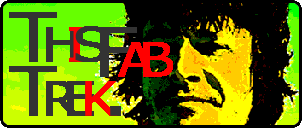





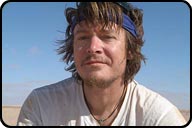
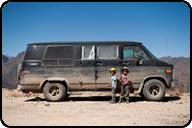
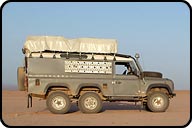

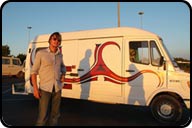
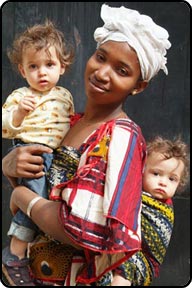
 contains Festival/Fiesta/Art photography.
contains Festival/Fiesta/Art photography.


